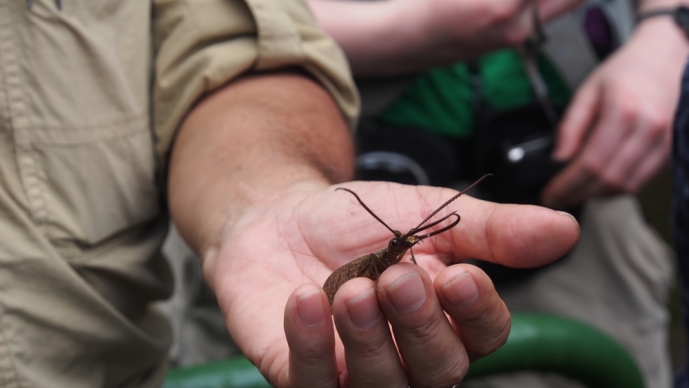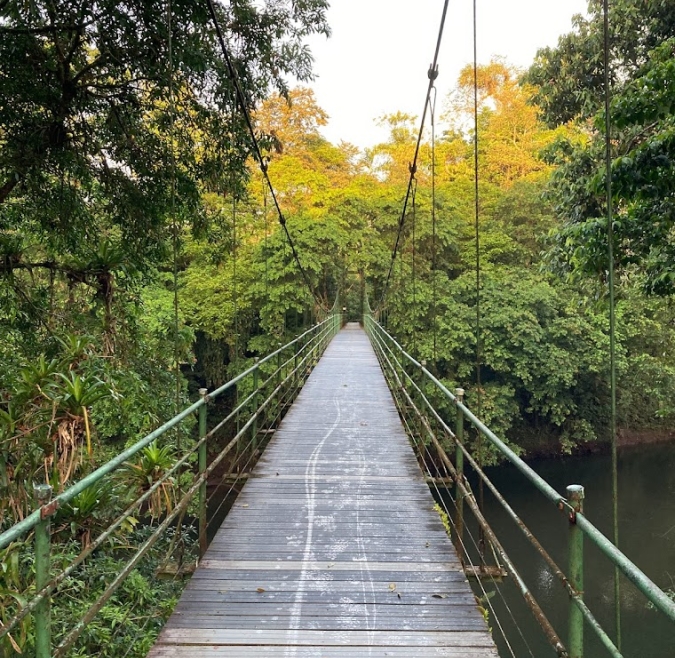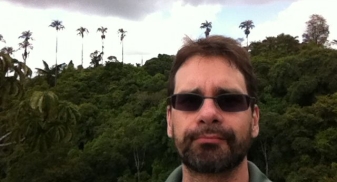Embedded Spring: Rutgers-Tropical Environments and Society
The Program
The field experience will explore the impact of climate change and human activity on tropical landscapes.
Develop a broad understanding of the physical, ecological, biological, and social dimensions of tropical environments. Explore the challenges and issues confronting tropical environments and the people that call them home through multiple lenses, including climate and climate change, ecosystems and biodiversity, land use and conservation practices, and agriculture and food security. Conduct hands-on research related to the tropical environments surrounding you during this week-long field experience at La Selva Biological Research Station in Costa Rica, with projects focusing on the relations between the conservation areas of La Selva and its changing surroundings.

Program Location

Costa Rica
La Selva Research Station
La Selva Research Station is one of the premiere biological and ecological field study sites in the world, with a history dating back to the 1960's. A pioneer facility for forest conservation, La Selva sits within a complex biological, socioeconomic, and political landscape. Situated in the Caribbean lowland rainforest in northeastern Costa Rica, La Selva's environment has undergone significant transformation in the past few decades in response to an expanding agricultural frontier, human population, and major infrastructure. Protected areas, such as La Selva, provide a rich opportunity for studying how natural ecosystems respond to a broader landscape matrix of human uses.
Academics
This embedded study abroad course is a 1-credit, weeklong field experience conducted during Spring Break.
This field experience, under the direction of Rutgers faculty members Professors Benjamin Lintner (SEBS-Environmental Sciences), Chloe Hawkings (SEBS-Entomology), Laura Schneider (SAS- Geography), and Lena Struwe (SEBS-Ecology, Evolution, and Natural Resources and Plant Biology), will explore the rich and biodiverse tropical rainforest ecosystem and consider how factors such as climate change and human disturbance are impacting it. Participating in hands-on research with course instructors, students will carry out hands-on, inquiry- and/or curiosity-driven research activities in groups and individually to foster a deeper appreciation of La Selva and its surroundings.
To read the 2024 syllabus for this course, click here. To view the 2023 course manual, click here.
For information about study abroad credit transfer, registration, and transcripts please visit the Academics section of our website.
La Selva is administered by the Organization for Tropical Studies (OTS). OTS is a non-profit consortium of over fifty universities and research institutions worldwide and maintains educational and research facilities in three different countries but with a particular focus on Costa Rica. OTS has trained many of the world's leading ecologists and boasts an impressive faculty and endless opportunities for exploration.
Housing and Meals
Students will share accommodations in “bunk-style” cabins, 4-6 students per cabin. Most meals will be provided by OTS.
Financial costs will be updated in the fall for 2025.
Financial Information
Program Costs
| All Students | |
|---|---|
| Program Cost | $1,850 |
Program Cost includes:
• Tuition
• Housing
• Most meals
• Program excursions
• Administrative Fees
• Emergency Medical Access Abroad
Out-of-Pocket Costs
| Airfare | $900 |
| Meals | $60 |
| Personal Expenses | $100 |
| Total | $1,060.00 |
Out-of-Pocket Cost includes:
The above costs are estimations and represent the known out-of-pocket costs students encounter during their time abroad.
Some of these expenses will be paid for prior to going abroad, such as an airline ticket, while some of these expenses, such as meals and personal expenses, will be paid in-country as part of your daily expenses. As you plan, you will need to budget these costs and spend wisely throughout your time abroad.



